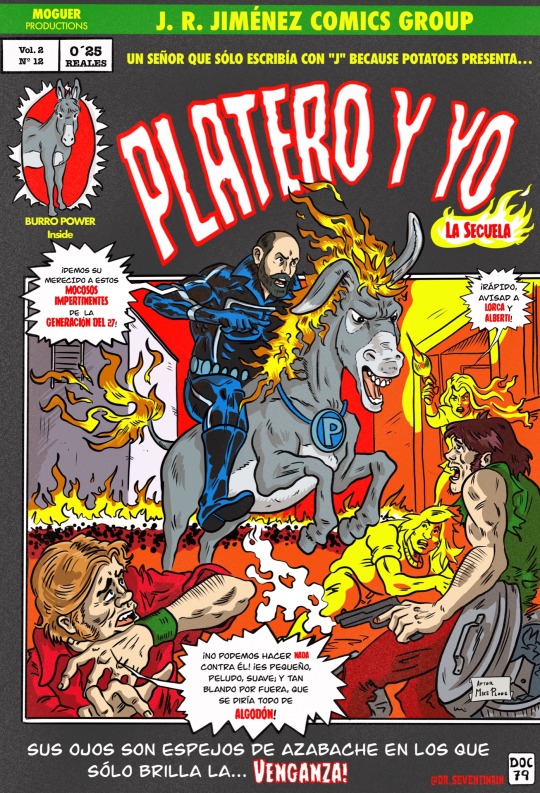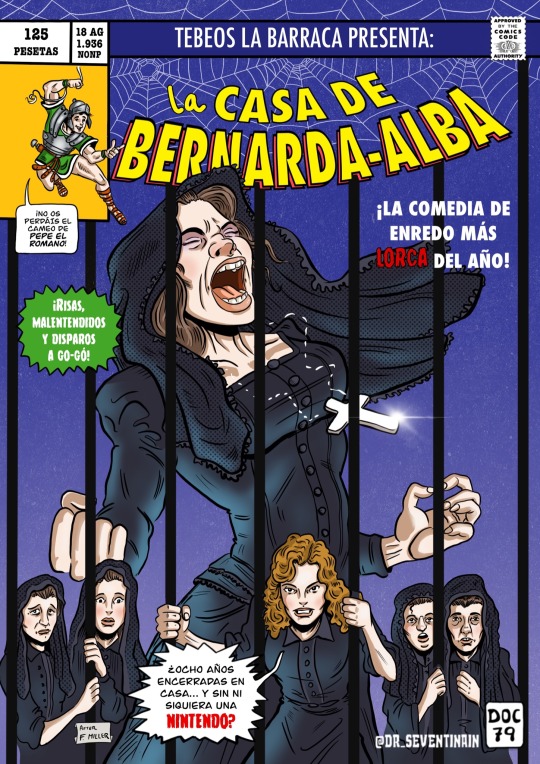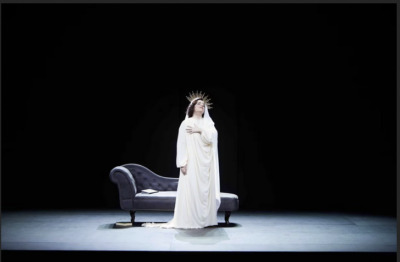#la regenta
Text










#clasicos marvelizados#literatura clásica#platero y yo#Lazarillo de Tormes#Cantar del mio Cid#la regenta#Fortunata y Jacinta#luces de bohemia#la casa de Bernarda Alba#la celestina#don Quijote de la Mancha
74 notes
·
View notes
Text
Raquel Vidales: La Regenta no es estúpida
La versión teatral de la novela de Clarín adaptada por Eduardo Galán y dirigida por Helena Pimenta reduce a la protagonista al estereotipo de mujer histérica y bobalicona
youtube
View On WordPress
0 notes
Text
La Regenta - Matadero Madrid 25.10.2023
La Regenta - Matadero Madrid 25.10.2023 #oper #uraufführung #spanien #madrid #teatroreal #teatroespañol #laregenta #barbaralluch #marialuisamanchado #leopoldoalas #clarin #rezension #musicwasmyfirstloveanditwillbemylast #operalover
Einer der spannendsten Orte für Kunst und Kultur in Madrid ist wohl das weitläufige, sehr schöne “Matadero Madrid. Centro de creación contemporánea” – hier gibt es viel zu sehen und zu erleben. 2010 wurde der grosse Saal Fernando Arrabal eingeweiht und – lucky us – hatten wir das grosse Glück die Uraufführung der Oper “La Regenta” von María Luisa Manchado Torres hier zu sehen, eine Koproduktion…

View On WordPress
#Anna Gomá#Barbara Lluch#Clara Peluffo#Clarin#Cristian Diaz#Gabriel Diaz#Jordi Francés#Josep Vila#Kritik#La Regenta#Laura Vila#Leopoldo Alas#Madrid#Maria Luisa Manchado#Maria Miro#Maria-Rey Joly#Matadero Madrid#Oper#opera#operalover#Pablo Garcia-Lopez#Rezension#Teatro Español#Teatro Real#Uraufführung#Vicenç Esteve#Vorstellungsbesprechung
0 notes
Note
Hi, can i ask you why in your opinion some people consider the moors a proper character in wuthering heights? Do you think the story would have been so different if it had been set in a different location?
I've wanted to sit on this for a bit to see if I changed my opinion/reaction, because I thought of an answer instantly. I'm going to be sincere, what I thought was "because people have not read enough (good) books".
I'm not entirely sure why people consider the moors a proper character because I don't think it works as one at all. I imagine a big part of the reason why is the appeal of the aesthetic and how powerful an impact it has had culturally and even in general in the collective imaginary, but I don't think that's exclusively due to Wuthering Heights. Trying to dig more, I'd say it's because of the importance it has for the characters, emotionally, narratively and symbolically. And, digging even more, I imagine it's due to the metaphysical bond and even ontological identification between moors and characters some people read into it.
Most if not all of these characteristics are typical of significant settings in books, though. They don't necessarily confer the settings the title of "character". And, as much abstract personality as they may have, in my opinion the moors are lacking something to be comfortable calling them so. In Wuthering Heights I'd say the house itself, Wuthering Heights, feels more like a character to me than the moors. Still, I'd say even then there's a certain something missing.
As much character or importance in ambience setting Bly Manor has in The turn of the screw, I don't think one could freely say it's a character on itself; that's sort of the situation with the moors in Wuthering Heights, I think. In comparison, Comala in Pedro Páramo, Hill House in The haunting of Hill House, Macondo in One hundred years of solitude or Vetusta in La Regenta, to name a few, feel a lot more like characters. They are books in which the settings themselves feel fleshed out with care, thoroughly developed like a character, and they even read as having a certain will of their own, as actively participating in the narrative at times. The moors in Wuthering Heights don't work that way. And it's not a bad thing. They don't have to, that's not their role.
Now, on the question about whether I think the story would be so different if set in some other location... I think the answer is both yes and no? Of course the book would never have been exactly the same had it taken place somewhere else, and the heather and in general the description of wildlife and vegetation are symbolically meaningful. But also, I didn't have a clear image of what the moors were when I first read the book. I imagined something infertile, isolated and cold, but that's it, and it worked. I didn't know how the English moors were at all.
I do think the isolation aspect is necessary to make Wuthering Heights, and I'd say perhaps even the cold and generally bad weather, but it's also true in a similarish way Pedro Páramo works with a place that is very hot. Ultimately it's up to the writer, and it will work if it's well written and well waved alongside the other parts forming the book. Wuthering Heights was waved with the moors in mind specifically, and it works. Would the story in abstract be much different if set somewhere else? Not necessarily, probably not, but it wouldn't be exactly Wuthering Heights, just as it wouldn't be if one were to change any other of its characteristics.
#The stormy windy weather works very well with Cathy's moods specifically for example but I don't think we see her be influenced or changed#by the weather the way Ana's mood is influenced by the rain in La Regenta for example. Which doesn't make the moody weather less important#It has symbolic and aesthetic aspect and in art that's very important on its own#Is the weather/wildlife/vegetation/setting important in Wuthering Heights? Yes of course#Could one set a similar story somewhere else and still be able to convey a similar effect and mood? Also yes. There are examples#I think I've talked about this before with both @faintingheroine and @13eyond13. About the importance of the setting in Wuthering Heights#and how other similar stories could be set in some other very different places. Or how despite the setting being very particular#in Wuthering Heights the story works and is very popular in other very different and at times faraway countries (such as Japan for example)#because more than the specificity of the moors the setting depends on the infertility perhaps‚ the mood it sets#and how it works with the narrative and characters‚ and mainly the isolation#One can easily translate that into something relevant to their own place and culture so to speak#I didn't want to include this (and some other things haha) in my reply to avoid making it longer still‚ but here it is just in case#Also there's an idealisation of Wuthering Heights in certain particular aspects‚which is something I talk about often with @faintingheroine#I think that too plays a role in making people consider the moors a proper character on its own#The topic is very interesting and this was fun to think about. Thanks for the question!#I hope my reply was articulated enough. I've been awake for thirty hours. I'll try to remember to come back later and give a look though#I talk too much#Wuthering Heights
17 notes
·
View notes
Note
💿 con quien quieras, amistad 💛
"I whisper gentle words, I'm not just pretending to be cute"
SOLDIER GAME (Love Live!!)
@boingdeguayava
✦ . ⁺ . ✦ . ⁺ . ✦

----Ey, mis palabras son sinceras, no estoy solo pretendiendo ser linda --No era su obligación ser amable con los humanos, pero a veces era simplemente aburrido dejar las cosas fluir sin intervención-- Podemos llegar a un acuerdo, pero mi oferta no durará por siempre. Debes decidirte ahora.
#hellooo#muchas gracias por enviar ^^#ella es chaewon (nombre mortal)#regenta un bar pero tambien es el 4to jinete del apocalipsis ah (?)#Piper;;Charos#letter;charos#also; me tome un poquito de libertad para adaptar la letra#para que calzara mejor kjdfhsldjkfg
0 notes
Note
may I ask what books you love outside of dostoevsky? ( if this sounds condescending or smth I really didn't mean it to be, I love dosto too, I'm just curious)
Don't feel bad about asking! I read quite a lot, it's just that I'm unable to let go of That One Book. I read both fiction and non- fiction (mostly philosophy, since it's my field of study).
Perhaps I'm a romantic at heart, being specially drawn to books such as Frankenstein, Wuthering Heights and The Sorrows of Young Werther. More classics I love are: The Quixote, Faust, One Hundred Years of Solitude, La Regenta, King Lear, War and Peace, Germinal, To The Lighthouse, The Plague and Orlando. I've also read the Hebrew Bible.
Some more modern ones that have stayed on my mind are Catch- 22, Beloved and The Left Hand of Darkness. I also think about American Psycho more than I probably should. One of these days I'll rank all the most disturbing books I've read.
This year I want to read more Elena Ferrante and Yukio Mishima. My Brilliant Friend (Ferrante) absolutely blew me away and I am both eager and scared to read the rest of Lila and Lenú's lives. From Mishima, I've read The Sailor who Fell from Grace with the Sea and Confessions of a Mask, and they both made a great impression on me. He's a controversial figure, but his writing is too fascinating.
I also want to read more poetry.
If we talk about non- fiction, off the top of my head I can name The Republic, Confessions of Saint Augustine, The Gay Science, Fear and Trembling, Man and the Divine and The Dialectic of Enlightenment. I don't think I "love" many of these types of books. Maybe another day I can talk about great philosophy works from another angle. Currently I'm reading through Critique of Pure Reason.
8 notes
·
View notes
Text

Lúnnera y Ozzi son diosas con una fuerte vinculación mágica. La Reina de la Luna asistió a la Academia Amarus Gratia durante su fundación, formándose junto al resto de mortales en la rama de la hechicería y los encantamientos. Gracias a su envidiable talento y poder divino, logró perfeccionar sus aptitudes mágicas de una forma extraordinaria, dedicando siglos de vida al estudio del cielo nocturno y las constelaciones. Hoy en día y gracias a ella es posible estudiar la hechicería de cristales refulgentes, también conocida como crysluxae; una rama mágica descubierta y concebida por la mismísima diosa. Estos conocimientos le fueron ocultados a la institución académica de Amarus Gratia al ser rechazada por el propio fundador tras ser descubierta haciendo un uso indebido de la magia. Con el paso de los años, Lúnnera perfeccionó sus habilidades y transmitió su sapiencia a su hija Ozzi, quien actualmente regenta la Escuela de Astrología como directora.
LEER MÁS
10 notes
·
View notes
Note
Sending this out to some of my favorite writers on here: What kind of books do you like to read? Any specific authors you enjoy and who inspire you? Feel free to go wild.
Ohhh this is an excellent question! And thank you so much, @djmorn 👉👈🥺 ❤️❤️❤️
Before I begin, two things. One, I have really little brain juice and even less time for immersing myself in books as I used to let's say a decade ago. Two, I have always been more of a non-fiction enjoyer BUT I will try to list some of my favourite works.
Starting with fiction, from the top of my head I can think of:
I have been known to be a huge fan of the Bronte sisters and Oscar Wilde (especially his plays).
La Regenta by Leopoldo Alas Clarín.
The House of Mirth by Edith Warthon.
For theater, my go to is Lope de Vega's plays and also classical Greek tragedies - Euripides, Sophocles...
When I was a teen I had a gothic slash romantic phase so asdfadfa you bet I read Poe, Le Fanu, Shelley (both Mary and Percy Bysshe), Keats, Algernoon Blackwood, Robert W. Chambers, Guy de Maupassant, Arthur Machen and a long etc (yk the vibe). Feels like a lifetime ago for me tho.
Love the Spanish Romancero (romances, ballads and epic poetry corpus) and general Siglo de Oro works (literature from the Spanish golden age but ughhh so much to get into, so little time).
Also for poetry Yeats. Yea. Long time no read as well. Your ask made me think about him again.
For more contemporary stuff, first thing that comes to mind is Strange weather in Tokyo by Hiromi Kawakami.
For non-fiction, I'm a serial bringer of randomness. From Mircea Eliade's works to Marvin Harris, I've read Freud and Jung for the funsies, Safranski, Locke, Rousseau, Camus, Spninoza, Nuccio Ordine, books on mythology and specific parts of history whose authors I'm afraid don't remember (ughhh so much to read in the history, historical fiction and biographies department still XD), Ortega y Gasset and was the target of (friendly) sass about it, mystical works by Saint Teresa of Ávila and of course shitload of Philosophy of Law (call it professional deformation) but especially my beloved Hans Kelsen. Ah. Just thinking about him makes me want to go and grab one of his books from my shelves right meow.
5 notes
·
View notes
Text
vimeo
The Magnificent Ambersons es la película más íntima y personal de Orson Welles, también su preferida junto a Falstaff – Chimes at Midnight.
Welles no tuvo control sobre el montaje final por no contar con la aprobación del público tras proyectarse en Pomona y la película pierde algo más de 43 minutos. Los 88 restantes resultan tan discontinuos, desconcertantes, enigmáticos y brillantes, que reconvierten la experiencia en un paseo por las ruinas de lo que había o habría sido (David O. Selznick no consiguió que delegasen una copia íntegra al Museo de Arte Moderno de Nueva York). Se nos ha negado, por tanto, su compleción. Esta mutilación deviene en una misteriosa narrativa que evoca The Searchers, The Wings of Eagles, El Sur o casi cualquier película de Mizoguchi (entre tantos otros ejemplos).
El año en que se estrena, Stefan Zweig se suicida con su esposa en Brasil, desesperados ante la posible propagación mundial del nacionalsocialismo. Casualmente, tanto Letter from an Unknown Woman (novela corta del autor llevada al cine por Max Ophüls) como la película de Welles atesoran algunas de las mejores secuencias que se hayan filmado jamás sobre personajes que transitan escaleras (como podréis comprobar en el vídeo que acompaña esta publicación). A colación de lo anterior, conviene recordar a Tourneur, que también rodaría ese año otra portentosa película en el mismo decorado por el que deambulan los Amberson.
Algunos planos picados de la película recuerdan aquello a lo que tan admirablemente aludía Clarín en La Regenta. De ese mundo contemplado desde las alturas en clave alegórica, nos vamos a otro distinto en los falsos contrapicados, al de Tierra, de Aleksandr Dovzhenko.
Shakespeare, Proust y Chéjov casi siempre están presentes en las películas de Welles, como también el ideario que subyace tras aquella célebre aserción elegíaca de Cocteau: filmer la mort au travail, cuya aplicación y extensión más representativa podría encontrarse en el personaje de Jedediah Leland en Ciudadano Kane.
Se han mencionado grandes autores con los que Welles establece diafonías y correlaciones, pero me resulta inevitable citar el hilo invisible que une esta película con buena parte del cine de Paul Thomas Anderson, ya que su adyacencia a nuestra contemporaneidad quizá no resulte tan evidente. El contrapunto podría localizarse en la primera aproximación a la novela de Tarkington en la que se basa The Magnificent Ambersons y que lleva por título Pampered Youth (adaptación en la que su director, David Smith, estuvo trabajando aproximadamente durante los años 1924 y 1925).
En la escena que figura a continuación, Orson Welles enclaustra dos corolarios fundamentales: la falta de autoridad en el seno de los Amberson y el sometimiento fantasmagórico y opresivo con el que George pretende dominar a su madre, alentado por su convencimiento de que Eugene —tal y como describe Shakespeare en Hamlet— se había precipitado con premura al tálamo incestuoso. En previsión de dicha catástrofe, decide acechar con vigía y desde una atalaya sombría mientras conspira para perpetuar la materialización de sus convicciones aristocráticas. Bernard Herrmann ilustra y enfatiza la insidia del personaje con su particular Ostinato.
Dado que el paso del tiempo y el tiempo perdido podrían considerarse dos de las obsesiones preponderantes y recurrentes en la filmografía de Welles, sirva de homenaje al esplendor y posterior decadencia de los Amberson esta joya poética de Manuel Alcántara:
"Yo no sé qué voy a hacer cuando se me vaya el tiempo y no pueda irme con él.
Tengo los días contados, y él ha perdido la cuenta del futuro y del pasado.
El tiempo siempre es presente y pasa mientras se queda, por eso nunca se entiende.
Jamás es pronto o después, por más que pasen los años no pasa el tiempo por él.
Ni lo pierdas ni lo ganes, el tiempo sabe que tiene todo el tiempo por delante.
No sé qué va a ser de mí el día que yo me vaya, y él no se quiera venir"
#the magnificent ambersons#el cuarto mandamiento#orson welles#tim holt#joseph cotten#dolores costello#agnes moorehead#anne baxter#richard bennett#ray collins#nancy gates#film#cine#Vimeo
3 notes
·
View notes
Photo










Plaza de la Catedral, Oviedo (No. 3)
The construction of the current [Oviedo Cathedral’s] façade began in the early sixteenth century under the design of Juan de Badajoz. Despite the time of construction, the Gothic style is still used instead of the Renaissance.
A low portico is built with three arches and three doors that give access to each of the naves. It is covered with an almost flat ribbed vault. The central façade, the most important both aesthetically and in size, is crowned with a relief of the Transfiguration and next to it some bas-relief figures representing Fruela I and Alfonso II the Chaste. A little further down some medallions representing the baby Jesus and Saint John child.
The doors made in the eighteenth century in walnut. The door of the central nave contains in the center of each of its leaves an image of San Salvador and Santa Eulalia de Mérida, both patrons of the cathedral and the Principality of Asturias. The temple is accessed through the door on the left.
With a height of 80 m it is divided into five bodies that decrease in size as you ascend. The tower begins integrated into the portico on the four pillars that form the arcade. It is topped with a temple formed by cylindrical towers that end in the arrow of the pinnacle.
In the tower we can find a clock on the second floor, on the top floor the shield of the bishop of Oviedo Cristóbal Rojas Sandoval who held the position at the end of the tower and in each section a window with mainel that hold braided stone otivals.
Famous tower in nineteenth-century Spanish literature because it is one of the inert protagonists of Leopoldo Alas' novel "Clarín" La Regenta. From his height and with the help of a spyglass, Don Fermín de Pas, the Magistral, watched over the city.
Source: Wikipedia
#Church of San Tirso el Real#Plaza de la Catedral#Oviedo#Uviéu#España#Cathedral Square#Oviedo Cathedral#Northern Spain#Southern Europe#Spain#Metropolitan Cathedral Basilica of the Holy Saviour#Cathedral of San Salvador#old town#tourist attraction#landmark#vacation#summer 2021#original photography#Catedral Metropolitana Basílica de San Salvador#Palacio de Valdecarzana-Heredia by Diego de Miranda#cityscape#architecture#Casa de la Rúa
8 notes
·
View notes
Photo

Ya disponible la colección de Ilsa más sus versiones no canon en el grupo de telegram. - Ilsa, She Wolf of the SS (1974) Dyanne Thorne es Ilsa, la implacable comandante de un campamento médico nazi que usa sus prisioneros (muchas veces mujeres desnudas) para las torturas más dolorosas y brutales que le pasan por la cabeza en el nombre de la guerra, y para demostrar su supremacía sexual. También usa a los reclutas masculinos para acostarse con ellos y al día siguiente castrarlos. - Ilsa, Harem Keeper of the Oil Sheiks (1976) Continuación de las sádicas hazañas de la loba de las SS, ahora convertida en suministradora de carne femenina para el harén de un millonario caid del petróleo. - Ilsa the wicked garden (1977) Greta (Ilsa) es la sádica directora de un clínica para chicas, situada en plena selva sudamericana, en la que científicos locos se dedican a curar a las chicas de desviaciones sexuales. Una joven consigue entrar para averiguar qué es lo que ha pasado con su hermana, la cual estuvo interna. Mientras, Ilsa y una de las guardias brindan todo un catálogo de perversiones sadomasoquistas con las internas y prisioneros masculinos... - Ilsa, the Tigress of Siberia (1977) Ilsa se encuentra con un antiguo prisionero del GULAG 14, el que fue uno de sus más duros oponentes. Ahora Ilsa regenta una cadena de lujosos hoteles y utilizará su poder para vengarse de su viejo enemigo. - Helga, la louve de Stilberg (1977) Helga traslada la acción a América del Sur, donde domina un castillo de prisioneras políticas, que son desnudadas y torturadas a su antojo. - nathalie escape from hell (1978) Una doctora rusa se encuentra encarcelada en un lujoso y elegante burdel para oficiales nazis de alto rango, a merced de un diabólico oficial de las SS. Si queires ver el catálogo de películas, puedes hacerlo desde aquí: https://letterboxd.com/pagina_podrida/list/catalogo-pagina-podrida/page/44/ Apóyame siendo colaborador y accede a todo el catálogo podrido de bizarro desde aquí: https://www.paypal.com/webapps/billing/plans/subscribe?plan_id=P-17T15945GG2998632MGRHJFY O desde aquí: https://www.facebook.com/becomesupporter/paginapodrida/ https://www.instagram.com/p/Cn93WNXu6j0/?igshid=NGJjMDIxMWI=
10 notes
·
View notes
Text

Paisaje en silencio II, 2022.
Exposición “En el borde de una isla” en el Centro de Arte La Regenta
www.joserosariogodoy.com
7 notes
·
View notes
Text
Jorge Fernández Guerra: La ópera de ‘La Regenta’ una producción lírica de muy alto voltaje
La Regenta viaja en el tiempo

View On WordPress
0 notes
Text
LISTA DE CONCIENCIA DE MI HERIDA (rompiendo con el automatismo de mi coraza: el ego)
DETONADORES
En mi pueblo: ¿Quién eres? Tu padre. Y vengo del futuro.
Cuando todo el mundo hace planes y a mí solo me invitan a un desayuno o un cafecito...
El final de La Regenta y La Casa de Bernarda Alba. Me asfixio.
Cuando compruebo que mis acosadoras de la escuela están vivas, coleando y en activo. Me frustra, me frustra, me frustra. Me aíslo. No me dan ganas de conocer a gente nueva... :(
Me da miedo tomarle afecto a alguien por acá: tarde o temprano dejará de hablarme sin motivo aparente. Son ellas. Cuentan cosas de mí a la gente. Me consta. Me quedo aislada. Me asfixio...
¿Cómo es posible que todavía esté pasando?
Cuando niegan la evidencia. Lo que estoy viendo con mis propios ojos. Y dicen que no, que no, que no. Está todo descontextualizado, dicen. ¡No puede ser! ¡No puedo haber descontextualizado toda mi vida! Me lleno de ira e impotencia. Comprendo, comprendo, comprendo por qué de pequeña siempre acababan regañándome a mí. Encima de perra, apaleada. Y yo, me volvía rebelde sin causa. ¡Mentira! ¡Mentira! ¡Mentira podrida! Me quedaba protestando hasta reventar... Nadie me escuchaba. Solo me quedaba aguantarme... Aguantar la soledad y el dolor.
El grupo de WhatsApp. Fue como volver a la escuela, sentirse sola y humillada. Todas lo saben, se ríen. Yo hago como que no me doy cuenta, también lo sé. Me refugio en la literatura y la imaginación. Me escuece todo por dentro. Un niño me señala, y dice:"esa que se vaya a tomar por culo, que no es de aquí"...
Cuando me siento mal y madre me regaña. Lo mismo me pasó con Sola hace poco. Le conté mis cosas y me mandó al carajo... Tal vez, me pasé de intensa... Lo amo con todo mi corazón, pero no puedo verlo. Ni siquiera estar en un grupo de WhatsApp con él. Me da mucha pena. Hasta escalofríos. Sé que nadie me está rechazando, al contrario. No obstante, salgo del grupo. :(
Huyeeeeeeeeeeee ¡te van a hacer daño!...
ACABO RECHAZÁNDOME A MÍ MISMA...
Menos mal que juré solemnemente, frente al contendor de basura, dejar de ser el Judío Errante...

[Soy libre solo por dentro... ]
#querido diario#cosas que escribo#pensamientos#escritora#relatos#superaciónpersonal#para pensar#resilencia#mi escrito#escritoras#feminismo
21 notes
·
View notes
Note
you seem to have a wide taste in books !! what are some books that you would recommend ??
Hmmm I wonder. I have the feeling I just read the same couple of books over and over, and at times only different iterations of the same story, like in that line by Borges ("the various intonations of a few metaphors").
I find recommending books without knowing anything at all about the person asking rather difficult. What I'd suggest to one may differ greatly from what I'd recommend to someone else. I'll give a list of some of my favourite books that I think are enjoyable in general:
— Thoughts by Pascal
— Cain: a mystery by Lord Byron
— The Iliad by Homer
— Crime and Punishment by Dostoievsky
— Othello by Shakespeare
— Pedro Páramo by Juan Rulfo
— Cyrano de Bergerac by Edmond Rostand
— The fragments of the Presocratics
— La Regenta by Leopoldo Alas, Clarín
— Tractatus Logico-philosophicus by Wittgenstein
— East of Eden by John Steinbeck
— Vita nova by Dante
— Contributions to the Founding of the Theory of Transfinite Numbers by Georg Cantor
— Caligula by Albert Camus
— North and South by Elizabeth Gaskell
— Peter Pan by J. M. Barrie
— Some essays by Russell. I personally love Mysticism and Logic
— Metamorphoses by Ovid
Poetry is perhaps harder to recommend because at times it translates horribly, but in general I love Baudelaire, Rimbaud, Lorca, Juan Ramón Jiménez, Rilke, Byron, Quevedo, Góngora, Lope de Vega, Horace, Catullus, Ovid, Tennyson, Maiakovsky, Garcilaso de la Vega, Oliverio Girondo, Vicente Huidobro, Emily Brontë, T. S. Eliot, Luis Cernuda and Edgar Allan Poe, to name a few.
#I talk too much#I wanted to say The tragic sense of life by Unamuno and Philosophy and Poetry by María Zambrano#but I thought maybe they'd be hard to find in translation. They're both approachable texts of philosophy beautifully written though#Unamuno's essay Vida de Don Quijote y Sancho (translated as Our Lord Don Quixote in English according to Wikipedia?) is also beautiful#I adore Schopenhauer and Nietzsche but I'm not sure I'd recommend them to anyone. Probably you can't go wrong with Kierkegaard though#I know what some of these books look like (like Wittgenstein's Tractatus or Cantor's Foundations)#but I swear they're approachable without specific academic background. The last line of Wittgenstein's Tractatus is one of my favourite#lines ever in the history of anything‚ philosophy or literature‚ but to be as hitting as it is you need to reach it at the end of the book#I think despite what it looks like both Cantor and especially Wittgenstein have an aesthetic intent in their writing#Wittgenstein in particular reminds me of Kierkegaard and Rilke and also of Unamuno and Zambrano. And of course Schopenhauer et al.#The Tractatus is very similar in my opinion to Huidobro's Altazor which is just amazing but I don't know how it would translate#These books I like in form and not just in content (although form is content like I think happens in Wittgenstein's Tractatus)#so when possible I'd read them in their original languages.I myself can't read German and know but very little of Russian and Ancient Greek#and a bit of Latin so I must be missing a lot of those. Nonetheless they're great in what I can get through translation#Perhaps you'd have the chance of enjoying them in full#If you can't read Russian I am actually quite specific with the translation of Crime and Punishment haha There's a concept#Razumikhin develops through the book at several points and often translators aren't consister with the word which makes the readers lose#the view of this development. And I happen to think the development works alongside the narrative of Svidrigailov#and also with what happens towards the end with Porfiry and Raskolnikov so I think it's important#In English there are several translations that maintain the coherence such as the one by Pevear and Volokhonsky#(the only one I can remember right now but I could check the rest). Garnett's translation is everywhere but that one doesn't do it#Hmmm Pedro Páramo in English takes some liberties and La Regenta isn't as funny which is what happens with Wuthering Heights#and The three musketeers in translation even when the translations are more accurate#I haven't recommended Wuthering Heights because I take you've read it but that's my favourite book#And I haven't recommended Pandora Hearts because that's a manga and you asked for books but it does some very interesting things#that I think are in line with many of the books listed here (as I said‚ I basically like the same few things retold over and over haha)#There are many books I am itching to recommend but that I can't do freely without some knowledge of the person asking#Like Steinbeck's arthurian novel or idk Gone with the wind#I hope this list is enjoyable enough. I'm not sure if I've been able to avoid being too partial#I suppose one has to bear the conditions of their existence and can't ever entirely get rid of themselves haha
16 notes
·
View notes
Text
i just realised... there's a possibility that there could be a la regenta episode 😳
2 notes
·
View notes